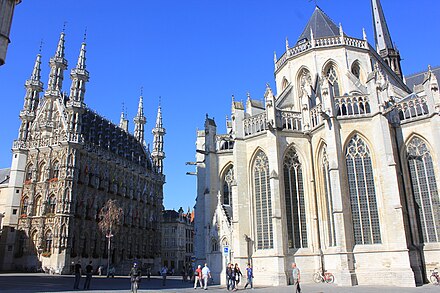Leuven (French: Louvain) is a flourishing and lively city of about 100,000 inhabitants (2018). It is the capital of the Belgian province of Flemish Brabant. It's a genuine university city which reflects in the streets. During the academic year (end of September until end of June) the city is full of young people, especially on weekdays. Sometimes it may seem that there are no other people living in the city. Summer in Leuven in general is calmer, although a lot of summer events are organised. The university that was founded in 1425 and has more than 40,000 students is the oldest Catholic university in the world. The historic centre is one of the most beautiful in Belgium.
Leuven has a very central location in Flanders, which makes it the ideal starting point to discover the other parts of the nation: Brussels is practically just around the corner, the coast is only a 1½-hour train ride away and Antwerp, Bruges, Ghent, Liège, Mechelen and Hasselt are nearby.
Leuven has everything to appeal to both young and not-so-young: buzzing nightlife, intriguing and sometimes stunning historic sites, the important and worldwide respected university and two seemingly unending shopping streets are sure to be to your liking.
Understand
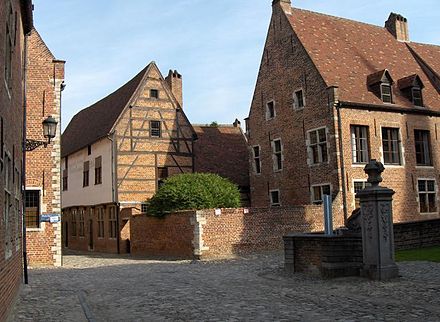 The city has a long and interesting history, being founded probably in the 9th century. It was particularly interesting because of the location, at the river Dijle and close to Brussels. Most of the city was thrashed and burned to the ground by the German invasion in World War I, and was again damaged during World War II. The historic centre however has been preserved and historic buildings like the University Library have been restored, partly with foreign relief funds.
The city has a long and interesting history, being founded probably in the 9th century. It was particularly interesting because of the location, at the river Dijle and close to Brussels. Most of the city was thrashed and burned to the ground by the German invasion in World War I, and was again damaged during World War II. The historic centre however has been preserved and historic buildings like the University Library have been restored, partly with foreign relief funds.
Leuven is located just east of Brussels (20 km). It is the capital of the Province of Flemish Brabant in Belgium. This means it houses a lot of administrative services and the Province Building, where the province council is located. Its main industries are technology (due to the University) and beer. Important companies such as InBev and Imec have their home bases in Leuven.
Leuven has two UNESCO World Heritage Sites, the Groot Begijnhof (Grand Beguinage) is part of the Flemish Beguinages. The Belfry on St Peter's Church is a part of the Belfries of Belgium and France. The University buildings and the Historic Centre are also on Belgium's tentative list to become a World Heritage site in its own right.
Get in
By plane
Brussels Airport in Zaventem is the main international airport in Belgium and has many direct international connections from North America, Asia and especially Africa. Brussels has flights from all European capitals and most other major cities.
To get to Leuven from Zaventem, you may take a suburban train to Leuven (13 minutes) for €9.10. It runs every half hour on weekdays and three times per hour on weekends. You may also take buses 616, 651 or 652 from the airport bus station to and from Leuven railway station (1 hr 15 min, €3). Taxis wait at the arrivals area (about 20 min, depending on traffic, ±€70, ±€45 for pre-booked taxis).
More low-cost carriers arrive at Brussels South Charleroi Airport but travel time to Leuven is considerably longer (at least 1½ hr). You can purchase a special bus+train ticket for €15.80 that will enable you to take the bus from Charleroi airport to Charleroi railway station, and from there on to Leuven train station. There is no direct train link between Leuven and Charleroi; you have to change trains in Brussels. Another possibility is taking the FlibCo shuttle at Brussels Zuid/Midi station which runs every half hour. Pre-booked taxis cost approximately €90. More information on the airport's website.
By car
Leuven can be conveniently reached by car. The E40 highway runs from Brussels via Leuven to Liège, whereas the E314 highway links Leuven with the province of Limburg and with Maastricht and Aachen, at about 1 hour distance. The city has installed a Parking Guidance System that guides you to the larger parkings in the city centre. Look for the electronic signs on the city ring road.
Don't bother looking for a free parking spot on the street, since it's expensive and the many one-way streets can be a real maze when you're driving.
The speed limit around the city is 50 km/h, or 30 km/h inside the ring road and in certain other areas. Your chances of getting a ticket when crossing the speed limit, even slightly, are close to 100%, especially on the ring road.
By train

Leuven Railway Station 📍 is one of the busiest of Belgium. There are frequent direct trains from:
- Brussels Airport (13 minutes)
- Brussels (Brussels North: 18 minutes; Brussels Central: 24 minutes; Brussels Zuid/Midi: 30 minutes)
- Mechelen (20 minutes), Lier and Antwerp (50 minutes)
- Ghent (1 hour) and Bruges (1 hour 20 minutes)
- The Flemish Coast, with trains from Ostend, Knokke and Blankenberge (1 hour 30 minutes) and De Panne (2 hours and 30 minutes)
- Aalst, Sint-Niklaas and Kortrijk to the west
- Aarschot, Diest, Tienen, Sint-Truiden, Hasselt, Genk and Tongeren to the east
- Liège (30 minutes), Verviers (55 minutes) and Eupen (1 hour 15 minutes) in the eastern part of Wallonia
- Mons (1 hour 30 minutes), Nivelles and Soignies in the western part of Wallonia
- Ottignies-Louvain-la-Neuve, where there is a connection with the train from Namur and Luxembourg Almost all cities can be reached by train through the Brussels North or Brussels Zuid/Midi hub. Thalys and Eurostar trains depart from Brussels Zuid/Midi.
By bus
There are bus lines from and to the cities around Leuven (Brussels, Tienen, Aarschot, Mechelen, Diest and Wavre). Buses are sometimes faster (and always cheaper) if you want to go to Herentals, Turnhout, Geel or other towns in the Kempen region. Almost all buses are operated by the Flemish public transport company De Lijn. The Bus station 📍 is located right next to the train station, but many bus lines also have stops on other locations in the city.
FlixBus offers direct connections (once daily), westwards to Ghent, Bruges and Ostend and eastward to Maastricht, Cologne and all the way to Prague.
By taxi
Licensed taxis have yellow-and-blue (or the older red-and-white) colors on top. They can be found mostly at the airport. One-way to Leuven usually takes 20 min (if traffic isn't dense) and costs about €70.
Get around

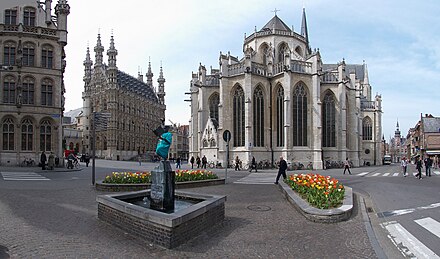 The city has installed several new touristic road signs and city maps at several locations, which make getting around in the city a lot easier.
Don't be afraid to ask people on the street for information, as they are usually very open and helpful towards tourists - some will even walk you to your destination.
The city has installed several new touristic road signs and city maps at several locations, which make getting around in the city a lot easier.
Don't be afraid to ask people on the street for information, as they are usually very open and helpful towards tourists - some will even walk you to your destination.
Public transportation
The public transport company De Lijn has a number of bus lines through Leuven. Centre of their network is the train station and the stop at the Fochplein. Since distances are not that big, you won't really need public transport unless you're going to Meerdaalwoud, Heverleebos, Campus Arenberg or the hospital Gasthuisberg. There is no subway or tram line.
On foot
When arriving in Leuven by train, walk to the Martelarenplein in front of the Station and walk down the Bondgenotenlaan in order to get to the city centre: the Grote Markt (Grand Place) where the tourist information desk is situated. Discover the rest of the historic city centre from there. Note that you can also take the Diestsestraat, which is a pedestrian-only street.
By bike
The city has many special areas for cyclers and most - but not all (beware of police controls) - 1-way roads can be accessed in both ways for cycles. It's very easy and comfortable. Make sure to lock your bike to a fixed object or the bike will be stolen. You can also rent bicycles. More information at the Tourist Information Desk (near City Hall).
By thumb
In the city centre, it will prove quite difficult to get around by thumb, since most streets and squares are car-free. If you want to thumb out of the city, pick a spot on the city ring road and hope for a quick pick-up. Most traffic is local or headed for Brussels. The Koning Boudewijnlaan is a good spot as well, since it leads to the offramp to the E40 (Brussels-Liège) and the E314 (Limburg).
Hold up a sign with your final destination, as most people will not 'just' pick up hitchhikers.
By taxi
Licensed taxis can be identified by the blue-and-yellow/red-and-white symbol and can be found near the Fochplein and the Martelarenplein. Although you probably won't need one, given the perfect railway connection, they're probably the easiest way to get to the airport, for example at night.
See

You can get more information about these sites and more at the Tourist Information Desk on the Grote Markt, near City Hall. While the most important old-looking buildings (Town Hall, Cathedral, etc.) are indeed from Medieval times, most of the common houses that look old are actually (non-faithful) reconstructions of buildings that were destroyed in the first World War; these buildings carry a stone-carved sign with the coat of arm of Leuven and the indication "1914".
- Town Hall (Stadhuis), Grote Markt 9, 50.8789°, 4.7012°. A richly decorated gothic building on the Grote Markt. The belfry is a .
- The small port of Leuven (Jachthaven). A port at the end of the canal connecting Leuven and Mechelen. In this area a lot of industrial sites are being transformed in expensive apartments. It is the home of Stella Artois beer.
- University Library (Universiteitsbibliotheek), Mgr. Ladeuzeplein 21, 50.877974°, 4.707384°, +32 16 32 4660. A beautiful building, a valuable collection. Also has an interesting, huge sculpture of a dead beetle (Totem, by Jan Fabre) on a needle in front of it.
- Fonske, Rector De Somerplein, 50.8793°, 4.7023°. The "fountain of wisdom"
- Lakenhal, 50.877836°, 4.700491°. The administrative centre of the K.U. Leuven. 2017-06-08
- Groot Begijnhof (Grand Béguinage), 50.872°, 4.697°. This beguinage, the larger of the two in the town, is a .
- St. Gertrude Church (Sint-Geertruikerk), Halfmaartstraat, 50.884114°, 4.699018°. 2017-06-08
- St. Gertrude Abbey (Sint-Geertruiabdij), 50.883690°, 4.698881°. 2017-06-08
- Klein Begijnhof, 50.884759°, 4.698898°. The small beguinage. 2017-06-08
- If you follow the river Dijle northwards from Brusselsestraat (near the Grote Markt) towards the area of the Klein Begijnhof, you will see a few Bruges-like scenes as the river passes by buildings.
- Park Abbey (Abdij van Park), Abdij van Park 7, 50.864440°, 4.717083°, +32 16 40 01 51. 1 km south of the city. On Geldenaaksebaan pass under the railroad bridge, then to the left.
- Collegium Trilingue, near the Vismarkt
- The Law Court (Gerechtshof), in the Rijschoolstraat.
- St. Peter's Church (Sint-Pieterskerk), UNESCO world heritage site on the Grote Markt.

- Castle of Arenberg (Kasteel van Arenberg), 50.863°, 4.683°. A château in the suburb of Heverlee, now a campus of the University of Leuven.
- British Military Cemetery De Jacht (Engels Militair Kerkhof), Bierbeekpleindreef, 50.848459°, 4.706380°. 5 km south of the city 2017-06-08
- Old Market (Oude Markt), filled with bars and restaurants
- Botanical Garden (Kruidtuin) There are picnic tables in the South East corner on your left from the entrance gate.
- War Monument for those who have fallen in World Wars I and II, on the Martelarenplein.
- M (M - Museum), 50.8788°, 4.7046°. The city museum, at the Vanderkelenstraat, close to the Ladeuzeplein and the Bondgenotenlaan. It has a permanent collection of medieval and modern art, and regularly hosts temporary exhibitions. Tickets give you access to the museum in the cellars of the St. Peter's Church.
- Monseigneur Ladeuzeplein and Herbert Hooverplein are two adjacent squares with a mixture of modern and older buildings. In a corner of Herbert Hooverplein is a monument depicting people travelling by hot air balloon.
- Keizersberg Abbey, Mechelsestraat 202 (end of Mechelsestraat, on top of the hill), 50.888610°, 4.696482°. It has Leuven's own "statue of Liberty", a 15-meter-high statue of the Virgin Mary overlooking the city from the park surrounding the abbey. 2017-06-08
Do

Culture and landmarks
- Visit the historic centre, the University buildings and the St. Peter's Church on the Grand Place. Information and guided tours can be found at the Tourist Information Desk.
- Leuven has a cultural organization called 30CC that organizes all kinds of cultural activities around the year, for example in the City Theater on the Bondgenotenlaan. Less frequent during the summer.
- A City Tour Bus leaves for sightseeing around the city from the Fochplein, situated right next to the Grand Place and City Hall.
Events
- Zythoos Bierfestival, Leuven. A festival in mid-April with over 600 beers presented by 100 breweries, featuring artisanal Belgian beer and international brews. Food (fries, burgers, sandwiches, pasta available.
- Visit the summer events Beleuvenissen (Every Friday in July), Hapje Tapje (First Sunday of August) and Leuven Kermis (Leuven Carnival) ) (September). The last weekend of July or the first weekend of August, M museum hosts a festival in cooperation with the cultural centre and Het Depot.
- Beleuvenissen is a musical and cultural festival on the squares in the city centre.
- Hapje Tapje is the one day in the year all bars and restaurants put stalls outside to promote their goods.
- Leuven Kermis is a carnival situated on the Ladeuzeplein and the Hooverplein (just next to it).
- Visit the Jaarmarkt (Year Market) the first Monday of September: The entire city centre is transformed into one big market. Cattle is also sold in the streets surrounding the Sint-Jacobsplein, 500 m from the Grote Markt, which is quite the spectacle. Schools in Leuven are closed for this occasion, so expect a lot of visitors.

Green
- Have a picnic in the Sint-Donatuspark in the city centre, 50m from the Ladeuzeplein.
- Visit the Kruidtuin (dead link: January 2023) or botanical garden on the Kapucijnenvoer, a side-street of the Brusselsestraat. The garden was founded in 1738 and is the oldest in Belgium.
- Make a walk or have a bike ride in Meerdaalwoud or Heverleebos, the green lungs of the city in the suburbs Heverlee and Oud-Heverlee easily reachable by bike or bus (15 minutes). Many good walking paths. Some parts of the forest are still untouched. For more information have a look at Ad's Path, describing many different possibilities for fun activities and how to reach them by public transport with the artwork (wood sculptures) made by Ad Wouters as the central theme.
- Take a boat trip down the Vaart, the Leuven-Mechelen channel. Step aboard in the small port in Northern Leuven, 500 m from the railway station.
Markets
- Visit the market every Friday on the Ladeuze- and Hooverplein, flea market every Saturday in the vicinity of the Grote Markt (Mechelsestraat), and flower market in the pedestrian-only part of the Brusselsestraat (the street leading away from the Grote Markt), every Saturday as well.
- Visit the Christmas market and shop for Christmas gifts, taste local specialties and drink a glass of Glühwein or brandy. Annually in mid-December on the Ladeuze- and Hooverplein.
Other
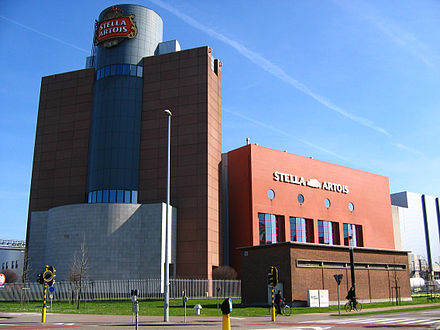
- Visit Inbev's main Belgian beer factory (Vaartstraat 94, +32 16 247 111 , fax +32 16 247 497), which produces such famous names as Stella Artois, Vieux Temps and Leffe Radieuse.
- Sports. Can be practised in the city Sports Centre, with a swimming pool (including small subtropic part with slides, sauna, steambaths and jacuzzi), fitness centre, squash courts and more.
- Cheer on the Leuven teams:
- Oud-Heverlee Leuven, 50.8684°, 4.6944°. Football club. They play soccer in First Division A, the country's top tier. Their home ground Den Dreef (or Kingpower), capacity 10,000, is by the ring road 1 km south of town centre. 2022-06-29
-
- Bears Leuven. Basketball club.
-
- Leuven Chiefs. Ice hockey team.
-
- Leuven Lions. American football team.
Learn
- Katholieke Universiteit Leuven (dead link: February 2023), the oldest Catholic University still in existence in the world (founded in 1425).
- Group T (dead link: January 2023)
- Katholieke Hogeschool Leuven (dead link: December 2020)
Buy
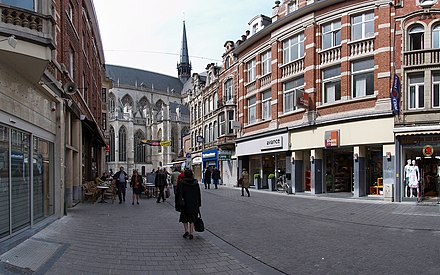
Shopping in Leuven is easy: you can pick one of the two main roads both starting at the Train Station and ending at the Grand Place, near City Hall and St. Peter's Church. Stores usually close around 18:00, and at 20:00 on Thursday. Supermarkets are usually open until 20:00, 21:00 on Friday.
- The Diestsestraat is the most important shopping street in Leuven. It is for pedestrians only for the total length of the street (about 1 km!). This street also has two small shopping malls, one of them housing the Kinepolis movie theatres.
- Look for smaller shops around the Brusselsestraat, Mechelsestraat and the Parijsstraat.
- The Bondgenotenlaan also features a lot of shops, but is also the main road between the railwaystation area and the centre.
- Leuven has a lot of clothing stores, jewellers, some fine bookshops and of course a few chocolatiers where you can buy genuine Belgian chocolate.
- Seasonal sales provide discounts up to 70% in January and July. Expect the city to be extremely busy, especially on week-ends.
- Tartufo, Louis Melsensstraat 14 (One block north of Bondgenotenlaan), 50.88073°, 4.70898°, +32 16 23 06 42. A small, independent chocolate shop that specializes in truffles in both conventional and unconventional flavours. Cash only. 2017-11-13
Eat
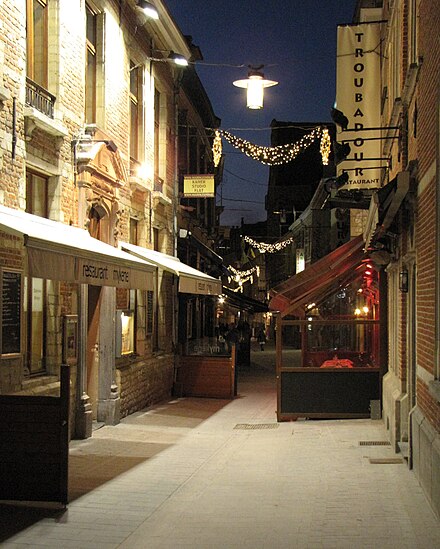
In general, you'd have to really make an effort to find a horrible meal in Leuven. Almost all restaurants are tasty and relatively cheap (for Belgium), given the student population. Many Belgians enjoy French fries and snacks in a Frietkot if they're looking for a quick and cheap bite. Try fresh North Sea Mussels, during their season (roughly August–March). Every year, you'll see the big signs announcing their arrival in front of many restaurants. Smoking is not allowed in restaurants.
The more common, bigger restaurants can be found right next to City Hall on the Grote Markt.
Look for cheaper restaurants on the Oude Markt (Old Market) as that's where the student population mostly enjoys their meal. It has many smaller restaurants and bars (the Old Market is sometimes called the longest bar in Europe), but all of them stop serving food after 22:00.
There are many good eateries and a great atmosphere (eating outside during the summer is a can't-miss!) in the Muntstraat, very different styles from classical French Belgian cuisine to "Mexican", Italian, Vietnamese, Chinese and Japanese. Consult the brand new website for more information. But these restaurants of this street are quite overpriced.
Parijsstraat has some restaurants with a nice atmosphere.
The Martelarenplein houses a lot of restaurants and bars just a stone's throw away from the railway station.
The cheapest choice are student cantines called Alma, which serve quite decent food for the whole meal less than €7-10 (two in the centre, one in the campus and many small ones). Students of KU Leuven get a discount, which makes each meal €5 cheaper.
Budget
- Grill Pyramid, Naamsestraat 29, 50.877393°, 4.700625°. A nice and cheap pizza & kebab place. This place is students' mecca for its delicious and cheap pizzas!
- Soupaway, Tiensestraat 29, 50.8780660°, 4.7036890°. 2023-02-05
- Past-a-Porter, Parijsstraat 8, 50.8790829°, 4.6995524°. 2023-02-05
- Club "Met", Brabançonnestraat 117, 50.8705372°, 4.7069664°. 2023-02-05
- Cappadocia, Brusselsestraat 156, 50.8807670°, 4.6926859°. 2023-02-05
- De Spuye, Tervuursevest 101, 50.8695683°, 4.6932683°. 2023-02-05
- Frituur Den Dreef, Naamsesteenweg 58, 50.8670201°, 4.6970475°. 2023-02-05
Mid-range
- Cafe Leffe, Bondgenotenlaan 20, 50.879436°, 4.704633°. Good food and as you would expect excellent selection of beers. €20-30 2023-02-05
- De Klimop, Martelarenplein 5, 50.880758°, 4.714115°, +32 16 22 86 21. Good Belgian food (menu also in English) with tables inside and outside on the square opposite the main train station €30-40 2023-02-05
- La Vignette, Martelarenplein 8, 50.881257°, 4.713853°, +32 16 20 03 32. Classic Belgian. 2023-02-05
- PepeNero, Muntstraat 19, 50.878077°, 4.702985°, +32 16 22 24 25. Very good Italian. €30-40 2023-02-05
- Brasserie De Abdijmolen, Abdij van Park 4, 50.864152°, 4.714839°, +32 16 62 96 00. In an old abbey you will find a modern furnished restaurant serving excellent Belgian dishes. 2023-02-05
Splurge
- Taste, Naamsestraat 62, 50.8758049°, 4.7002343°. 2023-02-05
- D'Artagnan, Naamsestraat 72, 50.8753571°, 4.7002095°. 2023-02-05
Drink

In Belgium, the legal drinking age in bars and cafés is 16 for beers and 18 for spirits.
Festivals
Attend the nearby and world renowned Rock Werchter music festival in late June/early July, or Marktrock in the city centre, around August 15.
Bars and Clubs

Leuven is truly a beer city, with the world's largest brewery Inbev being founded here. Try the many tasty beers, but beware, some have much higher alcohol levels than in the rest of the world! Bars are mostly entrance-free and prices are relatively low.
- You can visit the many bars around the Old Market every night, but expect a lot more ambiance on Wednesday and Thursday during the Academic Year, when the student population is in the city (late September - early December and early February - end of May).
- The area around the Tiensestraat, where there are bars owned by student organisations:
:Huis der Rechten, Tiensestraat 53, 50.877223°, 4.704718°. for law students :Politika, Tiensestraat 55, 50.877222°, 4.704836°. for social science students :Recup, Tiensestraat 51, 50.877290°, 4.704733°. for psychology students :Dulci, Naamsestraat 34, 50.877273°, 4.700442°. for economics students :Fakbar Letteren, Blijde Inkomststraat 1, 50.877355°, 4.708023°. for linguistics students :Délibéré. for the industrial engineers
Regulations have become stricter in the last few years and visitors of these bars may be requested to provide proof that they are KU Leuven students.
Other bars filled with young people are
:Café Belge, Oude Markt 35, 50.877909°, 4.698998°, +32 497 10 72 06. Has a wide variety of Trappists, abbey beers and special beers. In the day it is a normal cosy bar, during nighttime the bar is more filled with a younger and more progressive crowd. :De Giraf, Oude Markt 38, 50.877957°, 4.699037°. If you are a fan of shots, this is one of the places to be. With over hundreds of kinds of shots going from classics like a B52 to dared combinations like a Chilly Willy (drink at your own risk!), this is a perfect place to get a little buzz going. De Giraf has been mistakenly associated with a left-wing crowd but when you enter you will immediately notice that this is a sad cause of prejudice. :Lapaz, Tiensestraat 73, 50.877030°, 4.705430°. :Alegria, Oude Markt 31, 50.877644°, 4.698741°, +32 16 20 11 07. Very popular with college kids and high school students alike.
- Domus, Tiensestraat 8, 50.878632°, 4.703015°, +32 16 20 14 49. small home brewery and tavern, the beer they brew is only sold there for consumption.
Most parties take place in clubs in the city centre (and require a small entrance fee, €2-4):
- Club Montréal.
- Lido, Bogaardenstraat 33 (Right next to the Ladeuzeplein), 50.878325°, 4.709118°, +32 16 23 23 83.
- Musicafé, Muntstraat 5, 50.878297°, 4.702165°, +32 16 20 06 41.
- Albatros, Brusselsestraat 15 (100m from City Hall), 50.879479°, 4.699497°, +32 16 22 31 09.
Larger venues are outside the city centre, and have a slightly higher entrance fee (€5-9) and drinks cost a bit more.
- Club Room. Open on Friday and Saturday, offering theme evenings such as a gay-friendly evening every first Friday of the month. Take a taxi or a nightbus.
Sleep
Budget
- Youth Hostel Blauwput, Martelarenlaan 11, 50.882735°, 4.717726°. The Hostelling International youth hostel in Leuven. It's very modern and new, with a bar, a lounge, a terrace during the summer. From €19.50 per night
- Leuven City Hostel, Ravenstraat 37, 50.878535°, 4.708984°. Independent backpackers hostel in the centre. Nice and cosy, small hostel. Including breakfast and free coffee/hot chocolate all day. Free Wifi Internet available. Shared and private rooms available. Beds from €18
- Many Bed&Breakfasts can be found on the official tourist site. Relatively low price (starting from €30)
- {{sleep | name=The Cube Hostel | alt= | url=https://www.cubehostel.be/ (dead link: December 2020) | email= | address=Brusselsestraat 110, 3000 Leuven | lat= | long= | directions= | phone= | tollfree= | fax= | checkin= | checkout= | price= | lastedit=2018-04-29 | content= }}
Mid-range
- Hotel La Royale, Martelarenplein 6, 50.880940°, 4.714037°, +32 16 22 12 52. Cosy hotel with relatively cheap rooms, in front of the station. From €50 per night
- Begijnhof Congres Hotel, Tervuursevest 70, 50.871049°, 4.695438°, +32 16 29 10 10. Luxurious business hotel near the Grand Béguinage. More suitable for business people. From €115 per night
- Novotel Leuven Centru,, Vuurkruisenlaan 4, 50.885844°, 4.710510°, +32 16 93 90 01. Modern hotel about 250 m from the station. Easily accessible by car. From €115 per night
- IBIS Leuven, Brusselsestraat 52, 50.880437°, 4.696629°, +32 16 29 31 11. Cheaper hotel about 100 m from the Grand Place. From €65 per night
- Hotel New Damshire, Schapenstraat 1, 50.875891°, 4.697797°, +32 16 74 52 45. Cosy, somewhat business-like hotel about 100 m from the Oude Markt in a quiet street. From €108 per night
- Park Inn by Radisson Leuven, Martelarenlaan 36, 50.881347°, 4.717273°, +32 16 60-10-00, info.leuven@parkinn.com. Primarily a business hotel connected to Leuven Central Station via a pedestrian bridge. Modern well furnished, reasonable breakfast. Public parking under the hotel. 2020-09-21
- Theater Hotel, Bondgenotenlaan 20, 50.879333°, 4.704613°, +32 16 22 28 19. Small and somewhat luxurious hotel, 100m from City Hall and the Stadsschouwburg (Theatre Hall). From €99 per night
- Hotel Binnenhof, Maria-Theresiastraat 65, 50.878755°, 4.712168°, +32 16 20-55-92. Comfortable hotel 300 m from the railway station and in the neighborhood of the Ladeuzeplein and the arts faculty. From €90 per night
Splurge
- Klooster Hotel, Onze Lieve Vrouwstraat 18, 50.879203°, 4.695724°, +32 16 21 31 41. Modern high quality hotel just outside the city centre, near the old market, within an old cloister.
Stay safe
Leuven is a very safe and clean city, with very low crime records.
In general, there are no unsafe spots in the city best avoided. The streets are safe, even at night, although you better avoid public gardens at night. Even though most of them have closing hours which vary throughout the seasons. Of course, it is advised to take the precautions tourists are urged to take everywhere (e.g. to avoid pickpocketing). If you have a bike, make sure it is secured with a decent lock as students tend to 'borrow' bicycles. Similarly, jackets left unattended in bars may be at risk.
The city centre police station is located next to City Hall at Grote Markt. Don't hesitate to walk in if you have questions. Police usually patrol by car and on foot, and most of the times anonymously instead of walking around in uniform (especially at night). Try to avoid the area around Sint-Maartensdal and De Bruul (between Brouwersstraat and Pereboomstraat). There are also some spots in the suburb Kessel-Lo which are better avoided at night (Casablanca and Vredespleintje).
Police are especially harsh on traffic violations (also the ones made on a bike!), violent behavior and public disturbance.
Belgium and the Netherlands have different drug regulations! Smoking pot (marijuana) is not permitted, although it is tolerated when done indoors. An adult can never have more than needed for 'personal use'. Expect any more to be confiscated if they are found by police and you risk being penalized.
Useful phone numbers:
- Police: 101
- Emergencies: 112 (can be used from mobile phones).
- Local police: 016210611 (+3216210611 from abroad).
Leuven is a student city, and therefore has had a history of minor vandalism (garbage being thrown around, throwing beer cans) and public drunkenness. Lately, this situation has improved when talks between locals, student organizations and police were installed. Stewards now keep things organized and make sure the party is kept inside instead of in the streets. It is therefore advisable to keep a low profile in the streets at night, as police and stewards will act.
Stay healthy
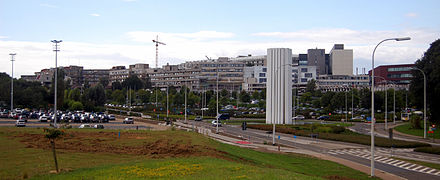
Leuven has two larger hospitals.
- The Academic Hospital UZ Leuven Gasthuisberg is the largest hospital in Belgium and is located just along the ring road.
- The Regional Hospital Heilig Hart is in the city centre. As always, dial 112 when you are in distress. You will be taken to either of both hospitals.
For smaller health problems, Belgians usually go to their family doctor, who are often in a group practice in city areas. Ask your hotel, hostel or guide for information on the nearest doctor. Going to the Emergency Room for small health problems will not only cost you, it will also take longer to get help (~45 minutes).
Leuven literally has a pharmacy at every corner. You can not buy medication in a supermarket.
Connect
As of July 2022, Leuven has 4G from Base / Telenet and Orange, and 5G from Proximus / Scarlet.
